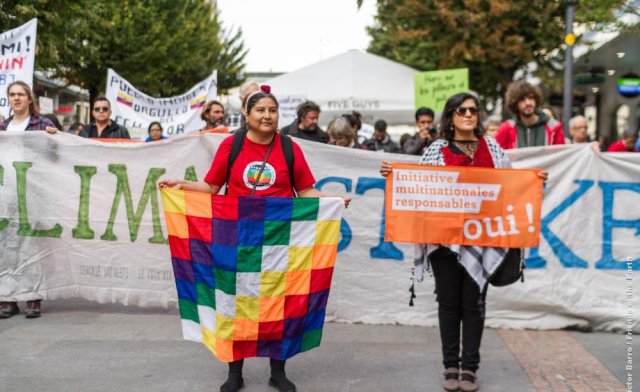Indeed, from the opening of the session, the presidency of the said Group, held by Ecuador, imposed a “cleaned up” version of the draft treaty [1], which provoked an outcry, mainly from the part of the African Group in corpore, but also of certain Asian and Latin American States.
In the version presented by the presidency, virtually none of the proposals of the Global Campaign [2], coming from social movements and communities affected by TNCs are taken into account. Worse, this document not only fails to respect the mandate of the Working Group contained in resolution 26/9, but it also arbitrarily excludes amendments from States in favour of a binding treaty on TNCs.
As formulated, the document presented by the presidency would have no impact on the impunity of TNCs and their value chains. Nor would it contribute to the restoration of popular and state sovereignty, undermined by the power of these entities. Basically, the declared aim of the presidency is to modify the mandate of this Working Group to broaden the scope of the draft treaty to any type of company, whatever its characteristics and even if it has no international activity. However, the Working Group in question was created with the aim of holding accountable TNCs that violate human rights and escape legal and democratic control due to complex legal arrangements. It is also supposed to create an effective mechanism so that victims and communities affected by these entities can obtain justice.
In this sense, a treaty on these entities must clearly establish:
1) the obligation of TNCs to comply with international standards in terms of human rights, labour law and environmental protection.
2) the joint liability of TNCs with their value chains (subsidiaries, suppliers, licensees, subcontractors, etc.), on civil and criminal grounds, both for legal entities and individuals (managers of TNCs).
3) an International Tribunal for the implementation of the said treaty as advocated by the Global Campaign, in order to ensure access to justice for victims and affected communities.
The presidency had the audacity to formally request a modification of the mandate of the Working Group. Thanks to the mobilization of the Global Campaign and the aforementioned States, this manoeuver was foiled. That said, continuation of the process is going to be difficult with a presidency that does not respect the agreed mandate and which only listens to Western states and the TNC lobby. For CETIM, a draft treaty that ignores the demands of people, affected communities and social movements would have no legitimacy. This is why it is essential to continue this struggle in line with those principles.




